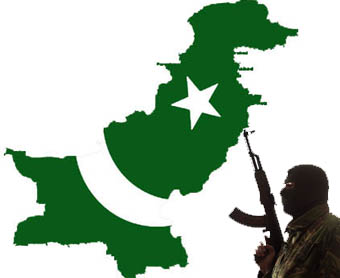Pakistan teetering in fight against terrorism
 Islamabad - In 2008, Pakistan wobbled in its fight against al-Qaeda and Taliban militants, who have grown into an enormous threat to the stability of the country and the entire South Asian region.
Islamabad - In 2008, Pakistan wobbled in its fight against al-Qaeda and Taliban militants, who have grown into an enormous threat to the stability of the country and the entire South Asian region.
Less than a dozen gunmen, believed to have come from Pakistan, slaughtered more than 170 people in the Indian city of Mumbai on November 26, heightening tensions between the two nuclear-armed countries. But in Pakistan, terrorists have been equally brutal towards their own countrymen.
Roadside bombs, suicide attacks and other tactics killed more than 2,000 people in 2008 - including civilians, security officials, politicians and foreigners - as Islamist insurgents strengthened control over almost all the mountainous tribal region along the Afghan border and parts of North Western Frontier Province (NWFP).
"Society is being terrorized into submission. Mosques, jirgas (tribal meetings), marriages and funeral gatherings are being attacked," Mahmood Shah, former security head of tribal areas and now a security analyst, wrote in a recently published article.
"Anyone who tries to oppose the radical elements, be it a religious scholar, a politician or an elder, is either eliminated or threatened with serious consequences," he said.
But the government does not have a workable plan to eliminate the menace of Islamic militancy from society, Shah said. "It seems our leaders are unable to decide whether Taliban are a force of good or evil."
Over the years following the Soviet Union's withdrawal from Afghanistan in the late 1980s, Pakistan used the armies of militants it formed with the assistance of the CIA to protect its eastern border, and infiltrate Indian-administered Kashmir to take part in the insurgency there.
Seen through this strategy, Islamic militants have always been regarded by the Pakistani leadership and many members of the public as a force of good that boosts the country's defence.
Pakistan's former president and military dictator Pervez Musharraf reluctantly abandoned support for the Taliban regime in Afghanistan and joined the international alliance against terrorism following the 2001 terrorist attacks in New York and Washington.
In the following years, however, he played a double game with his western allies.
His government handed over hundreds of al-Qaeda suspects to the US in a move to assure Pakistan's western allies it was committed to the struggle against terrorism.
But at the same time it turned a blind eye towards Taliban militants working quietly to extend their influence in Pakistan's north-western areas, where they fled after US-led forces invaded Afghanistan.
Their supporters, termed "local Taliban", gradually set up mini-states, with a parallel judicial system and police force, denied education to thousands of girls by torching and bombing schools, destroyed music shops and forced barbers to stop shaving men.
Peshawar, the main town in NWFP, came close to being under siege by the militants in late 2008 and insurgent forces are based just one and a half hours' drive from Islamabad, the federal capital of nuclear-armed Pakistan.
Dozens of suicide attacks devastated foreign investment in Pakistan, putting the economy in turmoil and forcing the country to resort to the International Monetary Fund for a financial rescue package to avoid defaulting on external payments.
"The country stands on the verge of collapse. Chaos reigns everywhere," said a defence analyst and retired general, Talat Masood.
The country's western allies were given renewed hope when Pakistan's new liberal government decided to go against some rebel strongholds after it took power following the defeat of Musharraf's political backers in the February 18 elections.
An all-out offensive in August against rebels in Bajaur, coordinated with with NATO troops on the other side of the border in the Afghan province of Kunar, forced rebels to retreat for the first time.
The government claims the offensive, code-named "Operation Lion Heart", has so far killed 1500 insurgents who had imposed Taliban rule in the district and launched cross-border attacks on international forces in Afghanistan.
The operation is yet to be completed, but NATO officials have already hailed it as a success.
"Cooperation between our troops and Pakistan is the best it has ever been," Brigadier-General Richard Blanchette, spokesman for NATO's International Security Assistance Force (ISAF) in Afghanistan, said in November.
But this increased cooperation stands on shaky ground.
Pakistan threatened to withdraw its 100,000 troops from its Afghan border as it feared an attack from the east by its traditional rival India following the Mumbai terror attacks.
Such a withdrawal would have left the western tribal grounds to the Taliban and al-Qaeda.
International efforts are underway to ease tensions between the two countries, but analysts say an effective fight against terrorism in South Asia needs regional cooperation, possible only when Pakistan and India manage to resolve their differences over the disputed Himalayan region of Kashmir.
Following the September 11 attacks, Pakistan initially reined in the Kashmiri mujahedin, who are believed to have links with al-Qaeda and the Taliban, and launched a peace process with India.
The absence of any major breakthrough in the peace talks has only reinforced support for the Islamist militants in Kashmir.
US president-elect Barack Obama hinted during his campaign that the US should try to help resolve the Kashmir issue so that Pakistan can focus on reining in the militancy on its Afghan border.
"That is the only way terrorists can be defeated in Pakistan, Afghanistan, or India," Masood said. (dpa)